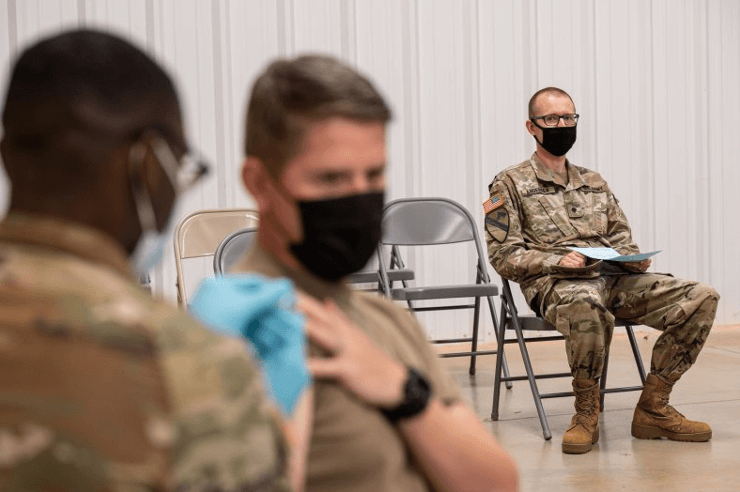Here at Military Justice Guides, we are dedicated to helping military members navigate the justice system. Recently, we’ve been asked the same question time and time again:
“I refused the COVID-19 vaccine, and now I am getting discharged from the military.
Can you help me?”
– MilitaryJusticeGuides.com Client
In July 2021, the President of the United States ordered the military to start taking steps toward making the COVID-19 vaccine mandatory for uniformed service members. Each military branch implemented this order with the following vaccine deadlines:
Service members will be considered fully vaccinated two weeks after their last shot. Reservists or members of the National Guard have delayed deadlines, but they are still required to be vaccinated.

Military members who refuse to be vaccinated should first attempt to get a religious exemption if their religious beliefs prevent vaccination. However, the vast majority of those exemptions have been denied.
Many members have received negative paperwork, such as a Letter of Reprimand or General Officer Memorandum of Reprimand, for refusing the vaccine. If you need help fighting administrative paperwork, select your branch of service above and purchase one of our guides.
The Department of Defense also announced its intent to administratively discharge members who continue to refuse the vaccine. How quickly troops can be kicked out for refusing to follow the vaccination order depends on factors like how long they have served, whether their commanders have already started issuing letters of reprimand and other punishments, and whether they are still awaiting a verdict on an exemption request.
It is absolutely possible that you will lose benefits if you refuse to be vaccinated. Although the type (or “characterization”) of your discharge depends on the actions of your command, it is possible that your service could be characterized as “Under Honorable Conditions (General).” This is a lower characterization than an “Honorable.”
If you are discharged for refusing the vaccine, and you receive an “Under Honorable Conditions (General)” service characterization, you are likely to lose your G.I. Bill benefits. You may also lose other benefits administered by the Department of Veterans Affairs. This could cost you thousands of dollars in benefits.
Finally, you may not be entitled to transitional benefits when you leave the military if the reason for your discharge is a refusal to get the vaccine. This may cause you to lose benefits like a VA Home Loan or Transitional Compensation.
First and foremost, you should fight your discharge because you believe that what the military is doing is wrong. You refused to get the vaccine because you wanted to do the right thing for yourself, your body, and your future. You should not give up on that fight now!
Also, at Military Justice Guides, we anticipate that people will sue the government in the future because they were discharged for refusing the vaccine. Their cases will be heard in federal and state courts around the country. If you just “take your discharge” without fighting it, you’ll never benefit from those lawsuits. But if you fight for your military career, and submit a response to your discharge, you may benefit from future litigation about the vaccine mandate.
As with any discharge, you have a right to respond in writing. At Military Justice Guides, we have the resources you need to submit a complete, professional response. Purchase our guide and follow our template for submitting the best response to your command. Protect yourself and your future by purchasing a guide below!
Military Justice Guides and MilitaryJusticeGuides.com are not law firms, nor do our employees act as legal counsel. MilitaryJusticeGuides.com provides an online portal to give users a general understanding of military law and to provide an automated software solution to individuals who choose to prepare their own documents. MilitaryJusticeGuides.com Services may also include a review of your answers for completeness, spelling, grammar, and for internal consistency of names, addresses and the like. At no time do we review your answers for legal sufficiency, draw legal conclusions, provide legal advice, opinions or recommendations about your legal rights, remedies, defenses, options, selection of forms, or strategies, or apply the law to the facts of your particular situation. We are not a law firm and may not perform services performed by an attorney. Military Justice Guides and MilitaryJusticeGuides.com, its related Services, and its forms or templates are not a substitute for the advice or services of an attorney.
